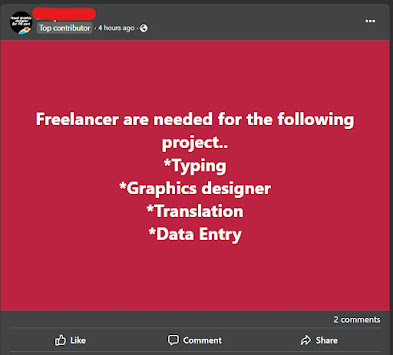A Newbie's Guide to Getting A Job As a Freelancer

Becoming a freelancer can be pretty straightforward. You just need to find a client willing to hire you for any specific project and accept the given terms and conditions. Make sure you are getting paid enough for the time spent on the project, and you should be okay.
Freelancing offers many benefits that traditional work cannot provide. Freelancers are their own bosses. They control when they want to work, how much they want to work, and where they want to work. They also get flexibility in terms of their income-since freelancers set their own rates based on their skill sets; there's no limit as far as how much money you can make, and you can become a specialist in a particular field.
Many people start freelancing without prior experience and do not know what to do.
You can avoid this by following these three steps:
1. Find the right job offer that suits your skills and experience
With so many different jobs available, it can be challenging to find the right one for you. Though there are no one-fits-all solutions, there are ways to narrow down your search. You should first identify your skills and experience to find jobs and careers where you would be a good fit.
When determining your skillsets, ask yourself these questions:
- What am I good at?
- What is the bulk of my experience about?
- What are my skills and competencies?
- What is my passion?
The answers to these questions will help you identify the services you will offer as a freelancer to start your search for the perfect place to find freelance jobs.
Avoid broadening your skillset to the point that you are not adequately skilled in any particular area. Again, the best approach here is to think about what you are passionate about/professional in and find a way to turn it into a service that can be marketed in the most efficient way possible. Next, you could consider optimising your profile to make it more appealing or relevant by adjusting the services offered, prices, types of content included in the service offering, etc.
2. Learn as much about freelancing and the platform you will use before you start applying.
Here are a couple of essential things you need to do before freelancing.
- Make sure you have the right market.
When starting out as a freelancer, it is important to identify the market niche you will be focusing on. It is easier to get a foothold in a specific market and build up your reputation before branching out into different markets with different audiences.
- Be active on social media.
Social media is a great way to network and find clients. Use social media to search for clients and keep up with new trends.
- Be sure that you're using the right platform for your skills.
There are a variety of platforms that you can use for your skills. The most popular ones are Upwork and Fiverr. Knowing which platform you will be using before starting your work to study it is essential.
Here are some of the best-known ones out there:
- Toptal
- Guru
- Upwork
- Freelancer.com
- People Per Hour
- Aquent
- 99designs
- Solidgigs
On these sites, freelancers post a profile of themselves and their work with their skills and what they are looking for. Let's use Upwork as an example. Here, freelance workers register with the site, allowing them to be connected with potential clients for work.
Once you're registered, you have to complete your profile. This includes uploading a professional photo and, selecting your service category, writing a self and service description, among other things. This is challenging if you do not know how to do it. To get an idea, visit one of the top-rated profiles that match the service you want to offer, and check out the following:
- What did they write on their profile and service description?
- What kind of photos are they using for their personal and service profile?
- How much are they pricing their service?
You should ensure potential clients see your profile in the best light possible. To evaluate your own profile, ask yourself these questions:
Does the profile look professional? Complete, relevant, and informative? Is the service affordable? Are the graphics colourful and attractive enough for the client to linger and read through your whole service profile?
By studying the competition, the information you gather can improve your own profile and service description.
Tip: Creating an engaging profile and service description can be difficult if you are not a copywriter. Luckily, just looking at what other freelancers are doing will help you see what works. Copy a top-rated seller's profile and service description, make it sound original by making a few changes to the word choice and sentence structure, and have your own profile. You can always make improvements later.
- Create a portfolio to show off your best work, qualifications, and previous clients.
Portfolios are a great way to showcase your qualifications and previous work. One of the most essential considerations in creating a portfolio is your website. Make sure it is easy to navigate and has an aesthetically pleasing design. The website should also include some of the past creative work you have done.
Unless they have a good portfolio, new freelancers can find it challenging to transition into the workplace. Otherwise, they may also need to take courses and develop technical skills that are often crucial for freelancing. The number of clients an individual freelancer can get if they have no portfolio will depend on the success of their previous work and the reputation they have for producing high-quality content. In short, if you have no portfolio to show, be ready to be ignored and rejected.
It will be a slow start, but here are a few ideas.
- Building a good reputation can happen gradually. It may take some time to get it going, but it will be worth the wait. For example, when selling on Upwork, start by including a testimonial from a previous client or employer. It can be both effective for boosting your profile and attracting new clients.
- Due to increasing competition on job boards, you must have a presence on as many freelancing sites as you can handle. However, it won't be enough to just show up everywhere. Make sure you have a well-built personal profile because it gives you the edge as a freelancer.
- It's important to keep sending proposals whenever possible. In Upwork, the amount of opportunity you have is limited by how many Connects you own. This is why having profiles on several freelancing platforms works well in your favour, as it will allow you to market your services to as many clients as possible.
- Share your freelancing profile on social media channels, and search for clients willing to hire you at a price you're comfortable with.
- Never copy and paste your proposal or cover letter.
When you submit your proposal or cover letter to a prospective employer, always try to personalize what you have written. A significant part of the hiring process is reviewing your previous work and seeing how well you have done in the past. If you submit the same proposal or cover letter for a different position, change some of the content and writing styles to not look recycled. The best way to do this is to use the information in the job description advertised by the client, match it with your own experience or expertise, and then share a work portfolio if you have one.
How to Get Your Initial Clients for your Freelance Business
The best way to get your first clients as a freelancer is by networking. You can get a referral from your friends, existing clients, and business partners.
Networking is a great way to expand your client base by reaching out to people in the industry or you already know. However, it's essential to be mindful of the time commitment that networking can take and the potential for interpersonal conflict when trying to go after new clients.
Do's and Don'ts When Building Your Portfolio of Work
Building a portfolio of work usually requires the following:
1) An organized structure
It's essential to have a well-structured portfolio. One that is easy to navigate and understand when someone is looking for your work. It should also represent you as a freelancer in the best way possible.
2) A clear goal and objective
Your portfolio should have a clear goal and objective. It should reflect your professional experience, skills, and interests. It's important to know what potential clients are looking for before so you can tailor your portfolio to be attractive to them.
3) An understanding of your client's requirement
To be a good freelancer, you must understand your client's needs. This can range from the service or content they are looking for, what kind of quality or format they seek, how they want it presented, etc. Without this understanding, freelancing can be difficult and frustrating.
4) A solid personal brand.
When you're a freelancer, you need to build your personal brand. Freelancing is a competitive field; without a solid personal brand, it's challenging to stand out from the crowd. A personal brand is a face of who you are as an individual and what you do for work.
Tips for Working With Clients in the Early Stages of Your Career
When working with clients early in your career, it can be challenging to know what to do. Clients often provide feedback, but it is up to you what to take and what not to take.
Many people have found success in dealing with clients in the early stages of their careers by doing a good job and by listening. They listen closely for feedback about their work, and they use that feedback going forward.
Doing good work and listening may seem obvious to work with clients early in your career, but some people don't follow this advice. These people might finish every job without getting feedback from the client, making it hard for them to grow as freelancers.
To summarize, finding work as a freelancer might be tough for beginner freelancers. As the freelancing market grows increasingly crowded, it is critical to discover strategies to distinguish yourself to be noticed. While it is true that it will be a difficult beginning, it is equally true that if you persevere, your patience and tenacity will be rewarded with a good-paying client and an infinite stream of projects in the future. So, carry on!
.png)


Now I know what I've been doing wrong,thank you. Great article too.
ReplyDeleteThank you.
ReplyDelete